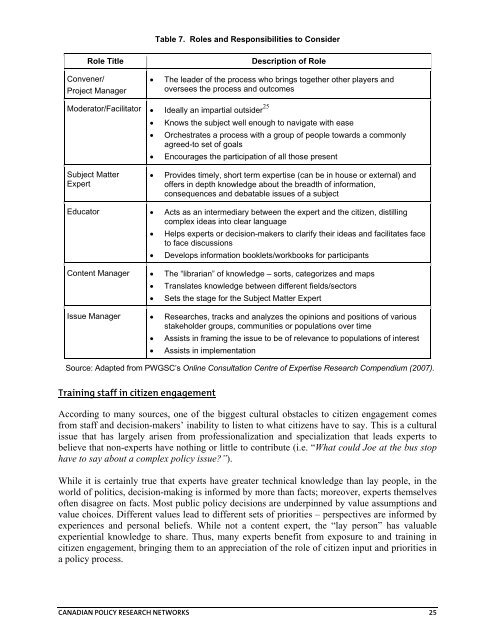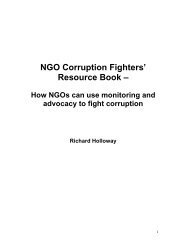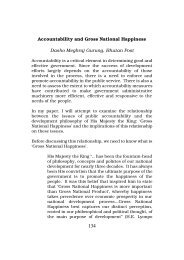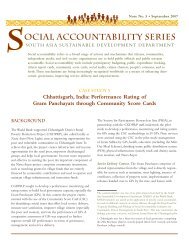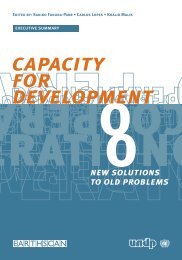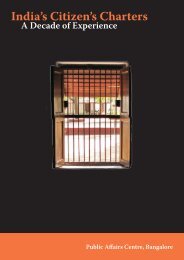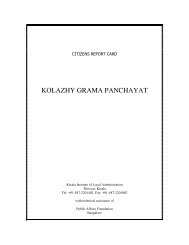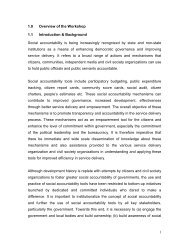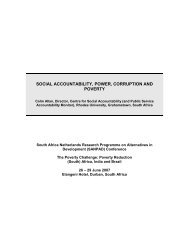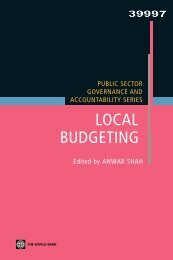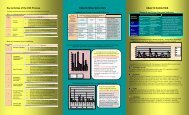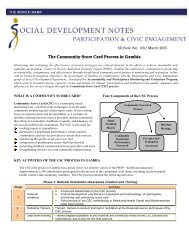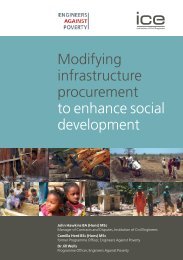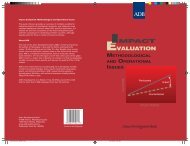Handbook on Citizen Engagement: Beyond Consultation - SASANet
Handbook on Citizen Engagement: Beyond Consultation - SASANet
Handbook on Citizen Engagement: Beyond Consultation - SASANet
- No tags were found...
Create successful ePaper yourself
Turn your PDF publications into a flip-book with our unique Google optimized e-Paper software.
Table 7. Roles and Resp<strong>on</strong>sibilities to C<strong>on</strong>siderRole TitleC<strong>on</strong>vener/Project ManagerDescripti<strong>on</strong> of Role• The leader of the process who brings together other players andoversees the process and outcomesModerator/Facilitator • Ideally an impartial outsider 25• Knows the subject well enough to navigate with ease• Orchestrates a process with a group of people towards a comm<strong>on</strong>lyagreed-to set of goals• Encourages the participati<strong>on</strong> of all those presentSubject MatterExpert• Provides timely, short term expertise (can be in house or external) andoffers in depth knowledge about the breadth of informati<strong>on</strong>,c<strong>on</strong>sequences and debatable issues of a subjectEducator • Acts as an intermediary between the expert and the citizen, distillingcomplex ideas into clear language• Helps experts or decisi<strong>on</strong>-makers to clarify their ideas and facilitates faceto face discussi<strong>on</strong>s• Develops informati<strong>on</strong> booklets/workbooks for participantsC<strong>on</strong>tent Manager • The “librarian” of knowledge – sorts, categorizes and maps• Translates knowledge between different fields/sectors• Sets the stage for the Subject Matter ExpertIssue Manager • Researches, tracks and analyzes the opini<strong>on</strong>s and positi<strong>on</strong>s of variousstakeholder groups, communities or populati<strong>on</strong>s over time• Assists in framing the issue to be of relevance to populati<strong>on</strong>s of interest• Assists in implementati<strong>on</strong>Source: Adapted from PWGSC’s Online C<strong>on</strong>sultati<strong>on</strong> Centre of Expertise Research Compendium (2007).Training staff in citizen engagementAccording to many sources, <strong>on</strong>e of the biggest cultural obstacles to citizen engagement comesfrom staff and decisi<strong>on</strong>-makers’ inability to listen to what citizens have to say. This is a culturalissue that has largely arisen from professi<strong>on</strong>alizati<strong>on</strong> and specializati<strong>on</strong> that leads experts tobelieve that n<strong>on</strong>-experts have nothing or little to c<strong>on</strong>tribute (i.e. “What could Joe at the bus stophave to say about a complex policy issue?”).While it is certainly true that experts have greater technical knowledge than lay people, in theworld of politics, decisi<strong>on</strong>-making is informed by more than facts; moreover, experts themselvesoften disagree <strong>on</strong> facts. Most public policy decisi<strong>on</strong>s are underpinned by value assumpti<strong>on</strong>s andvalue choices. Different values lead to different sets of priorities – perspectives are informed byexperiences and pers<strong>on</strong>al beliefs. While not a c<strong>on</strong>tent expert, the “lay pers<strong>on</strong>” has valuableexperiential knowledge to share. Thus, many experts benefit from exposure to and training incitizen engagement, bringing them to an appreciati<strong>on</strong> of the role of citizen input and priorities ina policy process.CANADIAN POLICY RESEARCH NETWORKS 25


